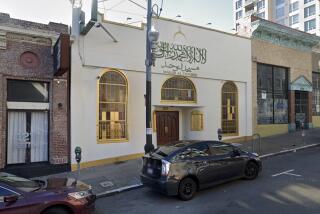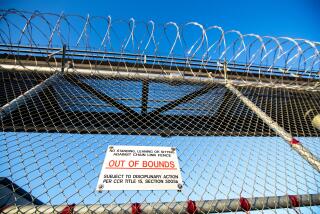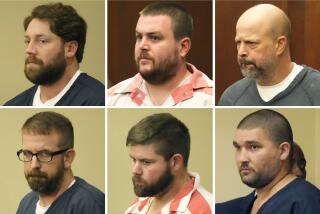2 Texas men get 3 years in prison for beating Sikh man and cutting off his hair
Two Texas men were sentenced Thursday to three years in prison for severely beating a Sikh man in Richmond, Calif., and cutting off some of his hair last year, officials said.
Chase Little, 31, of Beaumont, and Colton Leblanc, 25, of Winnie, pleaded no contest to felony assault and committing a hate crime against Maan Singh Khalsa during the Sept. 25 attack. The arrangement was part of a plea deal, according to Simon O’Connell of the Contra Costa County district attorney’s office.
O’Connell said the beating wasn’t just an attack. Little and Leblanc, the prosecutor said, went out of their way to cut Khalsa’s hair, which he maintained unshorn as part of his Sikh faith, “making this so clearly a hate crime.”
“We want to think that crimes like this only occur elsewhere and ‘don’t happen in our community.’ They do,” O’Connell said. “Reducing the frequency of hate crimes starts with recognizing that we need to do a better job of embracing our differences.”
Khalsa, 42, appeared before Judge Patricia Scanlon during the hearing in Martinez, Calif., and recalled details of the frightening attack. Attorneys released his statement after the hearing.
“Cutting a Sikh’s hair is one of the most humiliating things anyone can do to a Sikh,” he said. “By cutting my hair, the attackers did not just attack my body; they attacked my dignity, my spirit, my faith, my religion and my entire community.”
Khalsa was driving home on the night of the attack and stopped at a red light in Richmond, near Berkeley, when a white Ford F-150, occupied by five people, pulled up next to him, authorities said.
As beer cans were thrown at Khalsa, a motorist nearby called 911. When the light turned green, Khalsa drove off and called 911 as the truck followed him.
While stopped at another red light, two men got out of the truck, ran up to Khalsa’s car, reached into the open window, repeatedly punched his face and yelled profanities.
Khalsa tried to explain to his assailants, saying, “There is a misunderstanding; I am your brother.” He said he didn’t even think about rolling up the window when they approached him.
“My attackers hit me with their fists, knocked off my turban, and yelled, ‘Cut his … hair,’ ” he said in his statement. “They yanked my hair through the window and used a knife to saw parts of it.”
As Khalsa tried to shield his hair, his right pinky was stabbed. His finger eventually was amputated.
When the light turned green, Khalsa drove to a gas station and waited for emergency responders.
But the harm was done, he said, and his life “is forever changed.”
He had a swollen black eye, cuts and bruises, and his teeth were damaged.
Khalsa, an IT specialist at the Social Security Administration, said he emigrated from India in 2003 and always considered himself an American “like everyone else.” He spent most of his time volunteering, rock-climbing with his 8-year-old daughter, working out and horseback riding.
“I had never worried about being a victim of prejudice,” Khalsa said.
However, the actions of Little and Leblanc, he said, “have greatly affected every facet of my life; they have transformed my day-to-day experience and my very outlook on the world.”
Since the attack, Khalsa said he has trouble sleeping and remembering protocols needed for his job, sometimes resulting in mistakes.
After losing his finger, Khalsa said, he struggles to type — an important part of his job. He can’t lift heavy objects and rock climb with his daughter.
Along with the financial and physical toll, Khalsa said he suffers from anxiety, depression and post-traumatic stress.
“It’s difficult for me to go outside now without having pepper spray with me,” Khalsa said. “Now, when I interact with strangers, I am not as open as I used to be. I am more likely to view others not as my brothers, but as possible threats to my safety.”
Since the 9/11 attacks, there have been more hate crimes against the Sikh community, according to the Sikh Coalition. In the days after Khalsa’s assault, the coalition urged the Richmond Police Department and the district attorney to investigate the incident as a hate crime.
“Acknowledging that this bias-based attack is a hate crime under state law both recognizes the deep dignitary harm to Mr. Khalsa, and ensures that we, as a society, confront the problems of Islamophobia, racism and xenophobia that make the Sikh community a target for violence,” Sikh Coalition attorney Pawanpreet Kaur said in a statement.
According to O’Connell, a lead prosecutor in the case, Little and Leblanc had no affiliation with hate groups and had no remorse to their prison sentences or Khalsa’s statement.
In his statement, Khalsa spoke directly to his attackers, saying he still considered them brothers.
“I hope that you will learn about me and my community and one day consider me you brother too,” Khalsa said.
Khalsa said it will take years, possibly the rest of his life, to recover from the attack.
“But the recognition of the attack as a hate crime — as harm to my dignity and my entire community — is the first step in the process,” he said.
Twitter: VeronicaRochaLA
More to Read
Start your day right
Sign up for Essential California for news, features and recommendations from the L.A. Times and beyond in your inbox six days a week.
You may occasionally receive promotional content from the Los Angeles Times.






